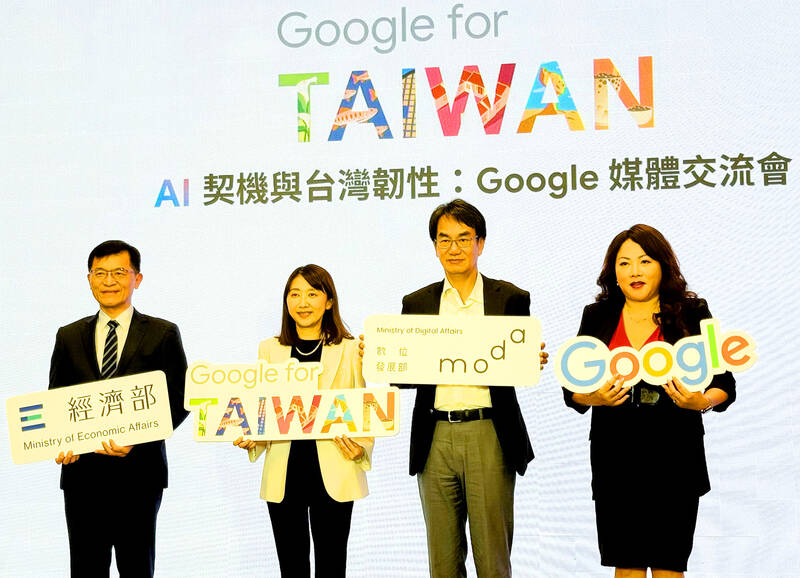Google yesterday said that Taiwan is set to accumulate about US$103 billion of economic benefits stemming from artificial intelligence (AI) development by 2030 and called on the government to work to strengthen AI infrastructure and universalize its use.
At its policy white paper announcement event in Taipei, Google said that McKinsey Global Institute predicted AI could add up to US$13 trillion to the global economy by 2030. The company added that in Taiwan, total gains were estimated to hit US$103 billion, citing a report by Access Partnership.
“The manufacturing industry is set to net the most, about NT$1.5 trillion (US$45.79 billion) or nearly 50 percent of all gains,” Google Taiwan managing director of sales and operations Tina Lin (林雅芳) said.

Photo: CNA
AI-driven cybersecurity tools could also help Taiwanese companies save up to NT$957.5 billion in economic losses from cybercrime by 2030, Lin said, citing the Access Partnership report.
Google has been playing its part by contributing to economic benefits and digital resilience through its investment in local research and development, data centers, and submarine cables, she said.
The company has also been working with the government and civil society to strengthen cybersecurity and combat disinformation, she added.
Lin highlighted the significant potential of AI in enhancing medical applications. Google, in collaboration with local hospitals and the National Health Insurance Administration, has been developing AI tools to aid in early breast cancer detection, assist with diagnosing illnesses, and predict medical conditions, she said.
Google Taiwan’s government affairs and public policy head Anita Chen (陳幼臻) said the government should invest in AI infrastructure, ensure the education system effectively cultivates talent and promote the use of the technology.
“Taiwan has key advantages in developing AI such as outstanding semiconductor and ICT [information and communications technology] industries, tech talent and a population willing to embrace new technology,” Chen said.
“But in the competitive world of AI, every decision could impact Taiwan’s ability to retain its competitive edge,” she added.
Chen said that the draft AI basic law was a good start and that Google recommended the legislation was “risk scenario-directed,” rather than placing restrictions on AI tools.
“The law should also determine ‘reasonable regulations’ concerning copyright so AI models can interact with a wide range of data,” she said.
Other policy suggestions include building an “AI talent-cultivating education system,” which should focus on training AI professionals and “equipping the general labor force with the ability to use AI applications,” Chen said.
The government should also promote the universalization of AI technologies, she said.
“The government can lead the way by using AI in public services to help universalize the technology and familiarize society with it,” she added.
Taiwan’s small and medium-sized enterprises and traditional sectors such as manufacturing and retail industries will need the government’s support in terms of funding and access to perform digital upgrades, Chen said.

Taiwan will prioritize the development of silicon photonics by taking advantage of its strength in the semiconductor industry to build another shield to protect the local economy, National Development Council (NDC) Minister Paul Liu (劉鏡清) said yesterday. Speaking at a meeting of the legislature’s Economics Committee, Liu said Taiwan already has the artificial intelligence (AI) industry as a shield, after the semiconductor industry, to safeguard the country, and is looking at new unique fields to build more economic shields. While Taiwan will further strengthen its existing shields, over the longer term, the country is determined to focus on such potential segments as

UNCERTAINTY: Innolux activated a stringent supply chain management mechanism, as it did during the COVID-19 pandemic, to ensure optimal inventory levels for customers Flat-panel display makers AUO Corp (友達) and Innolux Corp (群創) yesterday said that about 12 to 20 percent of their display business is at risk of potential US tariffs and that they would relocate production or shipment destinations to mitigate the levies’ effects. US tariffs would have a direct impact of US$200 million on AUO’s revenue, company chairman Paul Peng (彭雙浪) told reporters on the sidelines of the Touch Taiwan trade show in Taipei yesterday. That would make up about 12 percent of the company’s overall revenue. To cope with the tariff uncertainty, AUO plans to allocate its production to manufacturing facilities in

COLLABORATION: Given Taiwan’s key position in global supply chains, the US firm is discussing strategies with local partners and clients to deal with global uncertainties Advanced Micro Devices Inc (AMD) yesterday said it is meeting with local ecosystem partners, including Taiwan Semiconductor Manufacturing Co (TSMC, 台積電), to discuss strategies, including long-term manufacturing, to navigate uncertainties such as US tariffs, as Taiwan occupies an important position in global supply chains. AMD chief executive officer Lisa Su (蘇姿丰) told reporters that Taiwan is an important part of the chip designer’s ecosystem and she is discussing with partners and customers in Taiwan to forge strong collaborations on different areas during this critical period. AMD has just become the first artificial-intelligence (AI) server chip customer of TSMC to utilize its advanced

Chizuko Kimura has become the first female sushi chef in the world to win a Michelin star, fulfilling a promise she made to her dying husband to continue his legacy. The 54-year-old Japanese chef regained the Michelin star her late husband, Shunei Kimura, won three years ago for their Sushi Shunei restaurant in Paris. For Shunei Kimura, the star was a dream come true. However, the joy was short-lived. He died from cancer just three months later in June 2022. He was 65. The following year, the restaurant in the heart of Montmartre lost its star rating. Chizuko Kimura insisted that the new star is still down